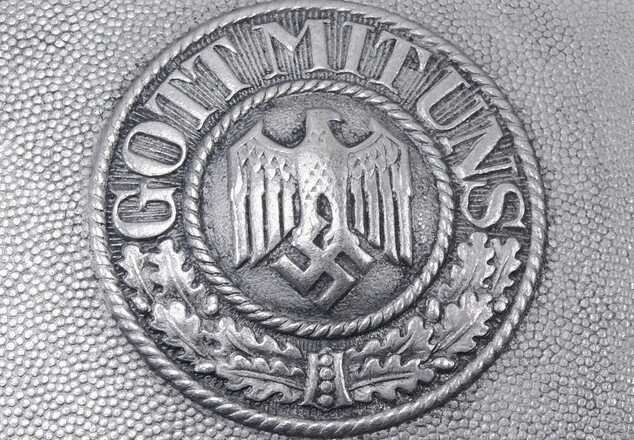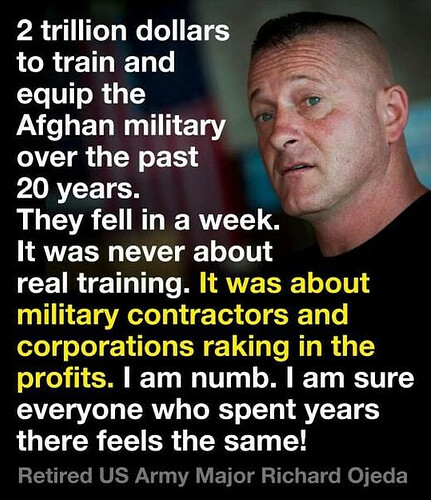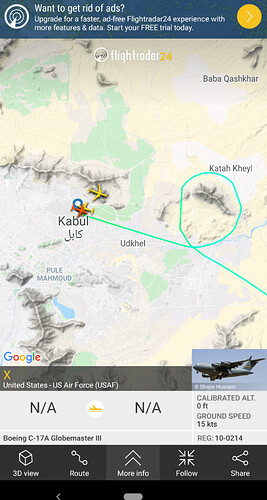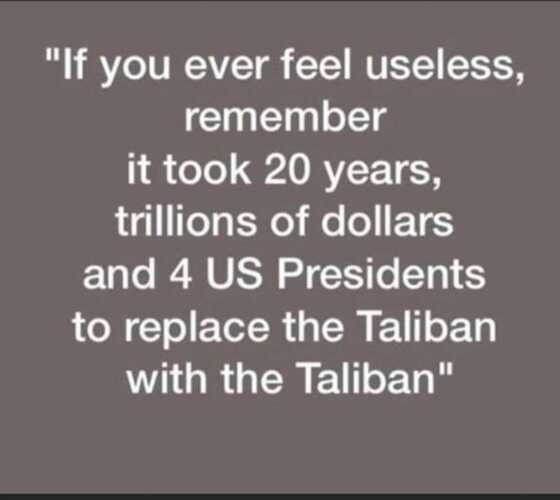Not funny Graham. And bad taste, given the number of people who are likely to be killed.
“a half-wit would have been surprised” There is certainly more than enough around in the politics of today. Having a military background, the rapid advance of the Taliban wasnt in the least surprising to me or most military vets, it was expected that they would make short shift of the opportunity. It is when all is said and done “Their backyard”.
72 but supplies are dwindling
Having had a bit of a think about his I would say that the only sensible repy is as the old country boy who is asked directions, “You wanna go where? Well, you’m best not start fr’m 'ere.”
So it has been with Afghanistan for 200 years or more.
Your second sentence is corrrect. But it’s too late now for ending involvement in ‘the middle east’ and the subcontinent. Since WW2 countries in the region have developed nuclear and/or chemical/biological offensive capabilty. Some mad man or group may use it.
The US thought that Saddam Hussein was that man. He’d already used chemical warfare on his own people. A graffito protesting about that was writ large on a wall next to the Iraqi school in Kensington - opposite my flat.
Hitler would have used the atomic bomb on Britain if his scientists had had the time to get it to operational level. His strategy of using the V1 and V2 - V for 'Vergeltungswaffen - vengeance - as weapons of pure terror, devoid of tactical merit, showed his hand as far as his intended use of the atomic bomb was concerned.
Pakistan and India have nuclear capability. One of the reasons why the US ‘supports’ Pakistan is to be close enough to the issue to be able to contain it. It may be that restraint by the US of their client state, Israel, has actually prevented Israel using nuclear tactical weapons against her enemies. They would dearly like to.
There is no refuge from involvement in the issues afflicting these regions. Neville Shute’s novel, ‘On The Beach’ is set in Melbourne, Aus. It tells of how the characters in the book face their impending, certain deaths from radiation, after a nuclear war in the northern hemisphere.
I think it is in the best tradition of the British reaction to dire straights. I think this trait is a credit to our tribe.
The belt buckle of every German soldier had ‘Gott Mit Uns’ stamped into it, and a crown or a swastika, depending which war.

At a point where to two oppposing trench lines were close enough, the Germans hoisted a board on a pole telling the Tommies opposite, “Gott Mitt Uns”
It being winter and freezing cold, the Tommies replied with a note on a pole which read, “We’ve got mittens, too!”
Pictures emerged of Afghans who tried to escape by clinging on to a plane taking off.
What happened to the Afghans who climbed on the plane
My book has now arrived, I love s/h hardbacks from US university presses, not least because their consistently high quality of binding is sadly hard to find elsewhere apart from the UK’s Folio Society. Nevertheless, I know there are some SF contributors who aren’t interested in the packaging, and for them I offer the following on the first hubristic and disastrous 1839 Brit invasion of Afghanistan, as described in the aforementioned tome,
‘These 15,200 soldiers took with them 38,000 servants, together with brass bands, bagpipes, polo ponies, packs of foxhounds, and thirty thousand camels burdoned with supplies. The officers of one regiment required two camels to carry their cigars and a single brigadier needed sixty beasts to haul his personal belongings.’
Plus ça change - earlier this evening I observed to OH that one originally saw Taliban fighters ( a neutral term) riding into battle on mopeds, then they graduated to Toyota Hi-lux with a rear mounted gun and now they’re parading into Kabul in abandoned US HumVees…
Have now nearly finished book, and am very impressed. To recap it’s a historical account of Alexander the Great’s campaigns in Afghanistan, almost 2,500 years ago, that was written only a few years after the US and their allies went into Afghanistan. The analysis is very detailed, it’s a description of a great military tactician, with a large, numerically and techologically superior force (albeit a coalition with conflicting aims and dynamics) trying to impose an alien form of cultural and political order on a disparate set of local tribes and warlords who not only knew about what became known as guerilla or asymetric warfare, but who were fighting on their own diffficult terrain and whose allliances were fluid, fickle and pragmatic.
As far as I can see, the only significant difference between Alexander’s Afghan campaign and the West’s most recent intervention is that the latter always had secure supply chains. Nevertheless, the latest outcome differs little from those of the past two and a half millennia.
That’s a WW2 buckle - the swastika is a bit of a give away.
The WW1 buckle had a crown in the middle but was otherwise exactly the same.
I’ve got a belt from WW2 that my grandfather took off a captured German soldier.
Only slightly related - I use an app Flightradar to normally track our flights from France to UK (that one of us is on).
I am surprised that via the app I am able to see military flights going in/out of Kabul along with the flight paths taken which are often anything but direct. Most flights are US Air Force and heading between Dubai & Kuwait and Kabul.
I’ve also seen Turkish and Hungarian planes in the last few days. One British plane today. A Boeing 737, probably Russian, and a Boeing C17-A on the ground at the moment. I think there must also be flights we can’t see where ADS-B transponders are not activated.
In a similar vein, I came across this site, which lists almost 100 years of British campaigns in the frontier regions with Afghanistan in what seems like endless destruction and hubris.
Americans like to think of ourselves as having valiantly tried to bring democracy to Afghanistan. Afghans, so the narrative goes, just weren’t ready for it, or didn’t care enough about democracy to bother defending it. Or we’ll repeat the cliche that Afghans have always rejected foreign intervention; we’re just the latest in a long line.
I was there. Afghans did not reject us. They looked to us as exemplars of democracy and the rule of law. They thought that’s what we stood for.
And what did we stand for? What flourished on our watch? Cronyism, rampant corruption, a Ponzi scheme disguised as a banking system, designed by U.S. finance specialists during the very years that other U.S. finance specialists were incubating the crash of 2008. A government system where billionaires get to write the rules.
Jonathan Pie’s shtick got very old very fast even if he is occasionally on point, this crap makes Pie look like a Scorsese masterpiece in comparison.





